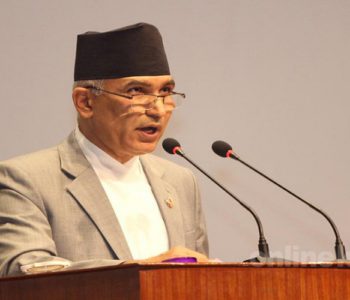Government forms committee to recommend new NRB governor

KATHMANDU: The Nepal government has established a three-member committee to recommend a new governor for Nepal Rastra Bank (NRB), as the term of current Governor Mahaprasad Adhikari nears its end. The Cabinet, in a meeting on Monday evening, appointed Deputy Prime Minister and Finance Minister Bishnu Prasad Paudel as the committee’s chair, with former NRB Governor Bijayanath Bhattarai and economist Dr Bishwo Poudel as members, according to government spokesperson and Communications Minister Prithvi Subba Gurung.
Under the Nepal Rastra Bank Act, a new governor must be appointed at least one month before the position becomes vacant. Adhikari’s five-year tenure concludes on April 7, 2025 (Chaitra 24, 2081). The delay in forming the selection committee had drawn criticism, with accusations that the government was insensitive to the economy’s needs amid adverse conditions and Nepal’s placement on the Financial Action Task Force (FATF) ‘grey list.’
The Act stipulates that the governor must possess high moral character and a postgraduate degree in fields such as economics, monetary policy, banking, finance, commerce, management, public administration, statistics, mathematics, or law, along with relevant experience.
However, coalition leaders are reportedly pushing for a politically influenced appointment, raising concerns among experts that a weak choice could deepen Nepal’s economic woes. They cite India’s 2013 appointment of economist Raghuram Rajan as RBI Governor during a crisis—marked by high deficits, inflation, and banking issues—as a model. Rajan’s bold reforms stabilized India’s economy, a precedent experts urge Nepal to follow given its fragile state.
Nepal’s economic indicators present a mixed picture. Remittances, foreign exchange reserves, balance of payments, and current account metrics are robust, yet over NPR 600 billion remains idle in banks. Despite declining interest rates, credit flow is stagnant, and repeated policy efforts by the Finance Ministry and NRB have failed to revive the economy. The FATF grey list status further jeopardizes Nepal’s international credibility.
Amid fears of vested interests influencing the selection, economists, former finance ministers, and MPs have called for a transparent process to appoint a capable, independent leader unswayed by pressure or lobbying. Critics point to recent government appointments marred by allegations of favoritism, financial dealings, and controversial picks, fueling suspicions of similar risks in the NRB selection. Swarthy groups are reportedly lobbying for ‘their’ candidates.











Facebook Comment